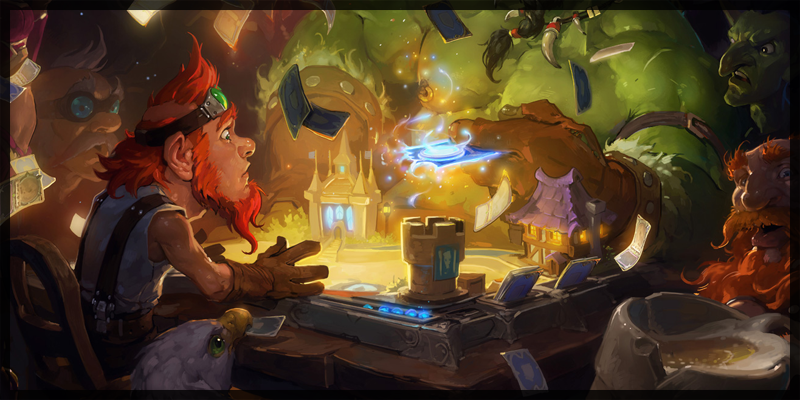Deckbuilding, analyzing the meta, mulliganing correctly, playing efficiently, identifying appropriate risks — there is so much to learn strategically in Hearthstone that it is easy to forget what is probably the hardest part of the game: maintaining a healthy competitive mindset. I talk to players all the time who understand the game, use good decks, and play well, but who struggle to play more than a few games a day because they get too upset. One of the most common reasons is tilt. I spoke with Archon's very own Zalae to get some insight into his experience with tilt and how he avoids letting it affect his performance.
Tilt is a term from poker for the downward spiral of anger, poor judgment, and lost money that happens when players fail to keep their cool at the card table. In Hearthstone and other competitive games, if you notice yourself playing worse or making different decisions than usual because you are upset or emotionally distracted — watch out, you're tilting.
I heard a rumor that you tend to be a pretty level headed player.
I spent the last three years of my life playing Magic: The Gathering tournaments 8-12 hours most days, trying to grind out a living. If I let myself get tilted, I would have been spending money instead of earning it, so I really had to figure out ways to teach myself to be less vulnerable to tilt.
The answer I came up with is that I can somewhat control my inner monologue, so I don't let stuff bother me as much. When their Boom Bots roll 4-4 and mine roll 1-1, instead of saying, "That's bullshit, that's so unfair," being upset and playing badly, I try to tell myself, "Yeah, I signed up for that to happen some percentage of the time when I decided to spend my life playing a game with random elements." In the long run, it evens out, I just need to keep focusing on making the best decisions that I can.
This sort of mindset change is like going to the gym. It's hard to do. It's very natural to be tilted when you get bad RNG. I still get tilted sometimes. It's easy to tell yourself not to let yourself get tilted, but then fall back into bad patterns, like making a New Years resolution to go to the gym and then eventually you stop for whatever reason. But if you work at it over a period of months, you absolutely see results. It works.
The advice I would give is to examine what you tell yourself when tilting things happen, and if you're saying things like, "That's bullshit, I'm so unlucky, that's so unfair," then you need to stop and correct yourself. Come up with some explanation of events to yourself that is less tilting.
You mentioned "tilting events." Different players get upset by different things, whether it's bad RNG, specific cards or matchups, lag/disconnects, BM, making mistakes, or losing to an opponent that misplayed. I find it helpful to know myself, so I'm on the lookout for what types of things are likely to set me on tilt. What do you personally find the most tilting?
Long sequences of unfortunate events. Not taking care of yourself also makes you much more vulnerable to tilt. Things like managing your food intake, sleep schedule, and personal life can all bleed into how vulnerable you are to tilt.
That's similar to something your teammate Firebat told me. When I asked for advice on improving my win rate on the legend ladder, he told me to take time between games, drink water, and eat fruit.
For laddering, you also need to know your limits, and when it's time to take a break.
I find that knowing how I tend to play differently helps me to identify when I am tilted and need to stop. Tilt affects everyone differently. Some players make more risky, aggressive plays to try to force wins out; others feel their RNG is cursed and play more conservatively. Some players are prone to concede winnable games early because of bad early luck, while others stay in unwinnable games too long, making themselves even more tilted. Some players despair of winning with anything and start switching decks before really testing any of them, while other players dig in their heels, trying to make the same deck work no matter how much it loses.
Do you have a sense of how your play tends to change when you're on tilt?
I'm probably more reckless. Sort of a "Fuck it, YOLO, I can't be bothered thinking through the risks" mindset. But my biggest problem is when I'm making big, obvious mistakes because I'm not focused.
So just plain missing things, like not playing around stuff?
Sure, or in extreme cases making obvious on board mistakes. If you mess up badly enough with taking care of yourself, you can make some pretty impressive blunders. I remember one time when I was younger, I was playing in a chess tournament. I hadn't eaten for a few hours before my match started, and matches can go pretty long. About four hours in, I was really hungry, and my ability to think just vanished. I gave away a Knight in just the stupidest way. It was a painful but valuable learning experience for me about the importance of taking care of myself.
Some of the most popular players in the Hearthstone scene are well known for getting upset. They still manage to perform well, but players that emulate that may not have the same success. Is there a secret here? Are some players just better when motivated by rage?
I don't think rage makes anyone play better, but it may hurt some people less than others. We all get salty sometimes, and maybe you can embrace the salt and do okay, but you'd probably be a little more focused and play a little better if you weren't upset.
Getting upset at bad outcomes kind of goes hand in hand with getting really excited about good outcomes, doesn't it? I think for a lot of players, that's a big part of the fun. Is there a way to have a healthy mindset while still enjoying the excitement?
Playing optimally and having a lot of fun can definitely be conflicting goals. One thing you can do is try to enjoy the bad RNG. Just say, "Wow, that's funny how unlikely that outcome was, I got REKT!"
That's awesome advice. Earlier today one of my opponents succeeded in summoning V-07-TR-0N. It was the best game I played all day.
Hilarious.
Coping with tilt is key to improving one's competitive performance in Hearthstone, but it goes beyond that. Taking setbacks in stride, knowing when to take a break, maintaining physical health, identifying when one's judgment is compromised, making a habit of positive self-talk — these are life lessons. Never let anybody tell you that competitive gaming is a waste of time: striving for excellence encourages self-improvement.
Make sure to keep an eye out for the next installment in this series on the competitive mindset in Hearthstone!








